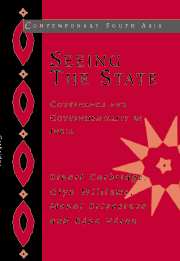Book contents
- Frontmatter
- Contents
- List of boxes, figures and tables
- Acknowledgements
- Glossary
- List of abbreviations
- Introduction
- Part I The state and the poor
- Part II The everyday state and society
- 3 Meeting the state
- 4 Participation
- 5 Governance
- 6 Political society
- Part III The poor and the state
- Appendix 1 Major national programmes and policies related to poverty alleviation, 1999
- Appendix 2 The 1999 general election in Hajipur
- References
- Index
4 - Participation
Published online by Cambridge University Press: 22 September 2009
- Frontmatter
- Contents
- List of boxes, figures and tables
- Acknowledgements
- Glossary
- List of abbreviations
- Introduction
- Part I The state and the poor
- Part II The everyday state and society
- 3 Meeting the state
- 4 Participation
- 5 Governance
- 6 Political society
- Part III The poor and the state
- Appendix 1 Major national programmes and policies related to poverty alleviation, 1999
- Appendix 2 The 1999 general election in Hajipur
- References
- Index
Summary
Introduction
The idea that ordinary people should have a say in the ways in which government programmes in the United Kingdom are run on their behalf is so well established that it has become a commonplace. Parents there have long been afforded some of the rights of scrutiny and decision-making which are now being extended to parents in rural Bihar through Village Education Committees. In principle, too, they are able to exercise some control over local planning and budgetary decisions through their participation in local government elections – again, just as in India. We know, however, from the UK and other richer countries, that turnout rates in local elections are often quite dismal, and that the democratic process can be undermined by backdoor deals with commercial interests, including property developers. It would be odd, then, if we didn't expect similar patterns of disinterest, subversion, and/or elite capture to hold in rural India. And yet even a cursory reading of some of the more ebullient texts of the Government of India, or of development agencies like DFID or the World Bank, suggests that such recognition is often played down or is simply missing. ‘Participation’, according to Bill Cooke and Uma Kothari, is threatening to become a ‘new tyranny’. It is a discourse that wishes away conflicts of interest and power, and which promises the poor not just direct sightings of the state but powers of oversight as well.
- Type
- Chapter
- Information
- Seeing the StateGovernance and Governmentality in India, pp. 121 - 150Publisher: Cambridge University PressPrint publication year: 2005



